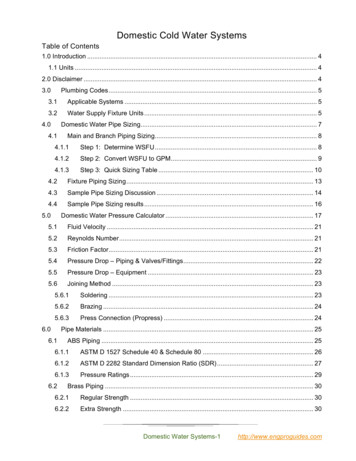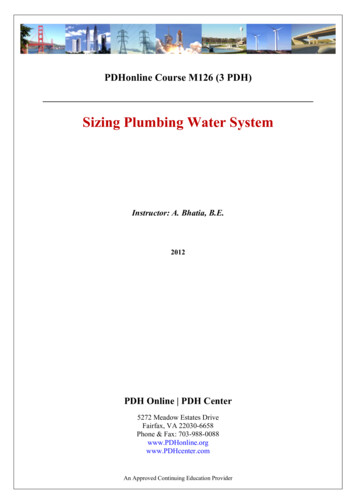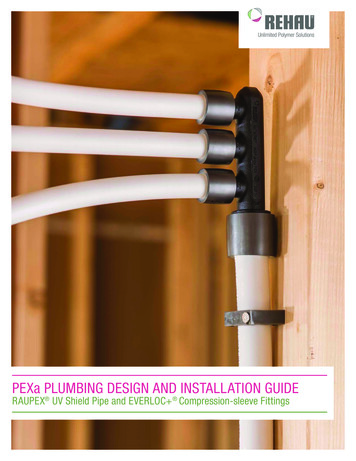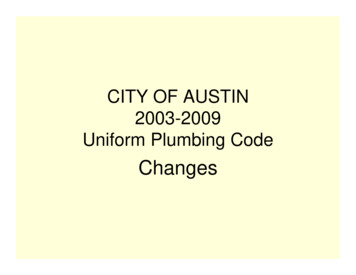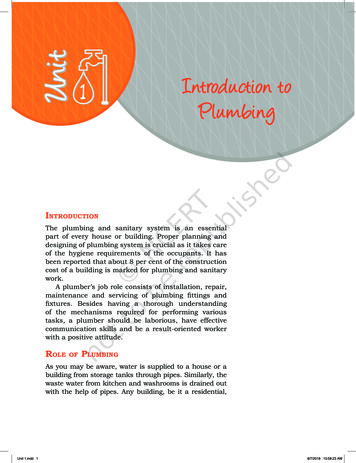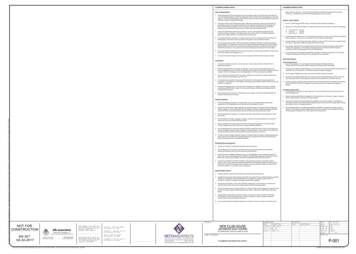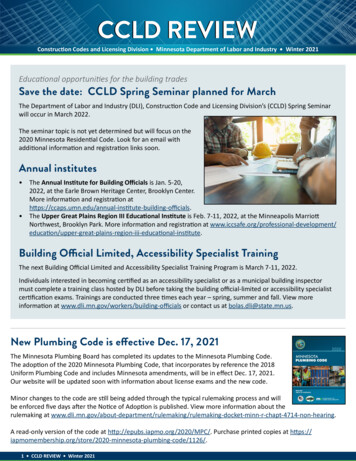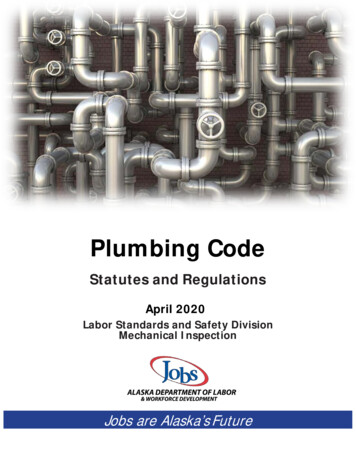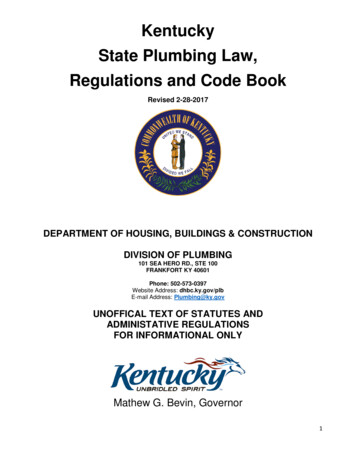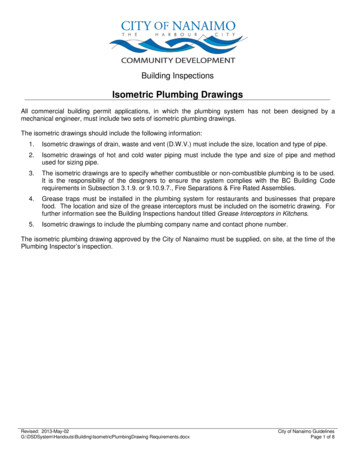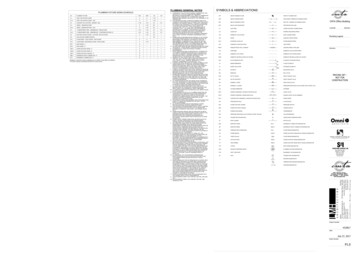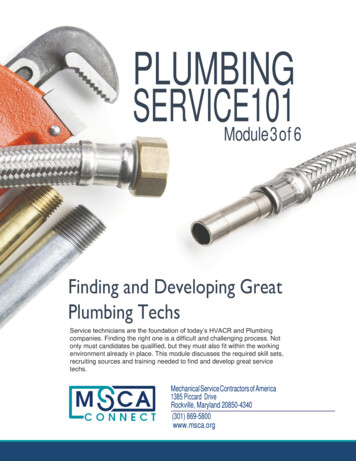
Transcription
PLUMBINGSERVICE101Module 3 of 6Finding and Developing GreatPlumbing TechsService technicians are the foundation of today’s HVACR and Plumbingcompanies. Finding the right one is a difficult and challenging process. Notonly must candidates be qualified, but they must also fit within the workingenvironment already in place. This module discusses the required skill sets,recruiting sources and training needed to find and develop great servicetechs.Mechanical Service Contractors of America1385 Piccard DriveRockville, Maryland 20850-4340(301) 869-5800www.msca.orgCopyright 2016 by Mechanical Service Contractors of America, Inc.
PLUMBING SERVICE 101Module 3 of 6Finding and Developing Great Plumbing TechsFinding and Developing Great Plumbing TechsLearning ObjectivesAt the end of this webinar, you will be able to:1. List the three skill sets required of plumbing service candidates.2. Identify recruiting sources for finding quality service plumbers.3. Determine the pros and cons of recruiting from non-union sources.4. Examine the ideal training curriculum for newly hired plumbers.5. Incorporate leadership actions that will maintain the culture of service andmake the plumbing work environment more enjoyable and respected.6. Identify plumbing safety and training resources available through MCAA,MSCA and the UA.
PLUMBING SERVICE 101Module 3 of 6Finding and Developing Great Plumbing TechsHELP WANTEDGreat job opening for person willing to get filthy, work insanehours and deal with agitated customers. Must be adaptableenough to get the job done under often trying circumstances.Physical fitness and mechanical inclination a must. Need topossess expertise in tiling, carpet, drywall, electrical,carpentry, concrete and asphalt. Excellent customer serviceskills a necessity.INTRODUCTIONAnyone posting an ad like that would surely find few candidates applying for the job.Yet the characteristics described above are typical of what it takes to succeed in theworld of plumbing services. While a plumbing occupation does offer an excellent careerpath for dedicated professionals, for those businesses looking to grow through theaddition of plumbing services, attracting and retaining qualified people capable ofproviding those services can present real challenges.The U.S. Bureau of Labor Statistics, which compiles annual information on a wide rangeof jobs and industries, projects the demand for plumbers, pipefitters, and steamfitters togrow 12 percent from 2014 to 2024, faster than the average for all occupations. Twofactors will drive demand for these workers: (1) New construction will require newplumbing systems. (2) Existing buildings will need updating and continual maintenance.While companies in other fields have met staffing shortages with technology, roboticsand even outsourcing to other countries, most plumbing services will continue to requireon-site support that must be handled by a qualified professional. Just as doctors arealways going to be needed to repair and maintain our bodies in good health, plumberswill always be needed to ensure that our plumbing systems work safely and effectively.The good news is that the demand for quality plumbing services is high and willcontinue into the foreseeable future. The not-so-good news is that in the world today,there is a shortage of trained plumbing professionals available to meet the demand forquality services. MSCA 2017Page 2
PLUMBING SERVICE 101Module 3 of 6Finding and Developing Great Plumbing TechsTHE PLUMBER’S SKILL SETWhen adding plumbing services to your business, it is apparent that finding andrecruiting qualified technicians will be one of the most important concerns necessary forsuccess. There are two types of plumbers to consider: project plumbers and serviceplumbers. Service plumbers handle service calls, preventative maintenance,troubleshooting, jetting, backflow certification and repair. On the other hand, projectplumbers handle anything beyond service calls, such as equipment change outs,retrofits, site utility repairs, and specialty work in medical facilities. No matter which typeof plumber is being hired, it is essential from the beginning to identify the required skillsets needed to perform that role.A highly-qualified plumber needs to possess three different skill sets. At the foundationare the technical requirements and abilities needed to do the job, which includes baseline plumbing knowledge, equipment operation and safepractices. Due to the nature of the work environment anddirect customer interface commonly involved, plumbersmust also possess good interpersonal and customerservice skills. This is especially true for service plumbers.Because project plumbers mostly communicate with sales,project managers and/or office staff, their customer serviceskills are not required to be as refined as service plumbers.However, both types still must be self-starters and selfmotivators. Plumbers are empowered to solve thecustomer’s problems in the most cost- effective, efficientway that does not compromise quality or safety. This often requires creativity along withgood problem solving and self-management skills, and the ability to operate on theirown initiative.TECHNICAL REQUIREMENTSThe technical requirements for a service plumber are extensive. Depending on the skillset, the knowledge required may be acquired from on-the-job training along with morestructured classroom learning leading to formal certifications, such as medical gas orbackflow testing certification. Areas in which plumbing expertise is desirable and whichcan lead to licensure include the following: MSCA 2017Page 3
PLUMBING SERVICE 101Module 3 of 6Finding and Developing Great Plumbing Techs Plumbing fixture repair and maintenancePlumbing piping system repair and maintenanceNatural gas piping, including sizing, exhaust and flue pipe sizingUnderstanding gas pressures and the use of a dual stage manometerUnderstanding sizing and capacities of gas regulatorsPlumbing codes and regulationsBy adding to their expertise, any of the following will enhance their skill set and makethem more well-rounded plumbers and therefore, more valuable assets to any serviceorganization. Electrical, controls, and low voltage conceptsSpecialized training on various equipment such as A.O. Smith, State, BradfordWhite and PVI for commercial and residential trouble shooting, maintenance andrepairTraining on commercial domestic hot water boiler systems such as Lochinvar,Laars, and A. O. Smith Burkay Genesis including installation, piping,troubleshooting, maintenance and repairGoing beyond testing by understanding exactly what the operation of a backflowassembly is and specifically how it worksAdvanced electrical device troubleshooting, i.e. pump panels, pumps, VFD'sDomestic water booster pump troubleshooting, maintenance and repairCommercial sewage ejector systems; panel, pump, and float knowledge,troubleshooting and repairDesign, troubleshooting, repair and maintenance of solar systems, rainwaterharvesting systems, water treatment systemsIt is also important that service plumbers be skilled with training in the operation andcare of machinery or equipment considered “tools of the trade” that are used on-thejob, such as the following: MSCA 2017Jetting equipmentDrain machinesSewer snakesBackflow testing ForkliftsManliftsSewer cameras and locatorsPipe threadersPage 4
PLUMBING SERVICE 101Module 3 of 6Finding and Developing Great Plumbing TechsSafety practices can never be overlooked as part of the skill set and any trainingcurriculum. The importance and implications for a plumber in considering the health,safety and well-being of the customers and end-users is paramount.First aid, CPR and fall protection are part of safety training taught to all trades. Inaddition, plumbers are often exposed to hazardous environments, containing noxiousgasses, hazardous chemicals and even bloodborne pathogens or other life-threateningA complete list of MSCA/MCAA safetychemicals. Not to be overlooked are the timesresources for plumbing service training iswhen plumbers must work in confined spaces,provided in the Appendix on page 13 at thesuch as tanks, pits, manholes, tunnels orend of this workbook.pipelines. Training in all these areas, includingpersonal protective equipment and clothing (i.e.hats, eye protection, gloves and shoes), is required to maintain a safe workingenvironment for the technicians and those around them.INTERPERSONAL SKILLSIt would seem that the technical skills of a plumber would be enough to guarantee agood employee. However, another skill set that deserves a close examination is theinterpersonal skills of the future hire. More than anything, the effective employee needsto have a good customer service attitude and have the ability to communicateeffectively while taking care of the client’s needs. That means being friendly,approachable, and customer-oriented. The ability to build a relationship with thecustomer goes a long way in ensuring positive outcomes and future business success.Plumbing issues are often disruptive and urgent in nature, making them major sourcesof frustration to most customers. Usually the need for a plumber is immediate and withcustomer patience already exhausted, this can lead to difficult situations for the plumberto handle. These situations mean that good listening and communication skills areessential to reassure the client about the work to be done and to soothe frazzlednerves. The plumber who can go above and beyond to exceed the customers’expectations with technical competency and good interpersonal skills is one that is trulyvalued. MSCA 2017Page 5
PLUMBING SERVICE 101Module 3 of 6Finding and Developing Great Plumbing TechsWritten communication skills are also important. It would be nice if our employees’writing skills were just as strong as their technical skills. However, with today’s limitededucational focus on writing ability, that is often not the case. Solving the paperworkdilemma is a problem facing almost every company offering plumbingand mechanical services. Spelling, penmanship and how to properlywrite up an invoice or work ticket are all important communicationskills. What do you do with someone who has good technicalskills, but falls short when it comes to accurately completingneeded paperwork?The move to a paperless work environment in many casesmakes it easier to compensate for poor writing skills, but plumbersstill need to be able to write legibly. In many work environments, transitioning to tabletPCs and software has helped with poor spelling (spell check) and bad penmanship(typing) issues. Some systems and devices even allow the plumber to record or delivertheir notes verbally for electronic transcription instead of typing them.Today’s smart phones and tablets can handle andautomate a portion of many office functions, includingdispatch communication, recording time, filling outtickets and documentation. If those assist tools fail andwritten communication is still not adequate, managerscan always use the carrot of “paperwork accuracy” as ameasurable KPI (key performance indicator) that canhelp motivate and reward technicians for betterperformance with written documentation.SELF-MANAGEMENT SKILLSOne of the greatest challenges faced by many employees is self-management or theability to prioritize and complete tasks to achieve a specific outcome within a particulartime frame with little oversight. Plumbers often face the additional pressure of having topatiently troubleshoot seemingly impossible problems that are sometimes hidden or donot readily present themselves. MSCA 2017Page 6
PLUMBING SERVICE 101Module 3 of 6Finding and Developing Great Plumbing TechsUsing good judgment and demonstrating critical thinking are essential parts of selfmanagement. The ability to work through issues without giving up cannot beoverlooked. When dealing with customers, plumbers need to show the highest levels ofintegrity by explaining exactly what’s needed to fix the problem and not overselling thecustomer with a speculative fix or an additional unneeded service.RECRUITING PLUMBERSThe pool of qualified plumbing candidates is quite small, creating a recruiting challengefor most companies. Many service plumbers have come from commercial andresidential construction with varied skills gained predominantly through on-the-jobtraining.Companies whose primary business is plumbingtypically recruit from a variety of available“Don’t hire from a candidate pool of one.”sources with non-union competitors andresidential and commercial construction beingthe most viable options. In fact, one plumbing company found that almost 98% of theirnew employees came from a non-union company with the other two percent switchingfrom construction.Because the available pool of qualified plumbingcandidates is relatively small, it may take some creativityto find potential new hires. Paying referral bonuses toexisting employees who recommend and/or bring peopleon board is one way of attracting new plumbers.Reaching out to vendors or suppliers to see if they willallow “now hiring” flyers at their counters is anotherstrategy for obtaining candidates. Brainstorm ideas with existing employees. Theircreativity may surprise you.So as a predominately unionized workplace, what are the “pros” and “cons” of hiring thenon-union plumber? MSCA 2017Page 7
PLUMBING SERVICE 101Module 3 of 6Finding and Developing Great Plumbing TechsPros of Recruiting from Non-Union Shops These plumbers usually do not receive many benefits besides wages, such ashealth care or pension, so additional benefits may prove very enticing. Mosthave worked very hard for much less compensation in the non-union world. They are generally more loyal employees because they don’t a have a networkof other union workers at other companies to compete for their skills. Oncethey are on board and become acclimated, they usually stay. Residential plumbers tend to have excellent customer service skills. Many have experience working on commission and get tired of the sellingaspect and pressure. Sometimes you find a gem.Cons of Recruiting from Non-Union Shops Normally they haven’t gone through a formal apprenticeship training programso they may be lacking some skills which they otherwise would have learnedduring their apprenticeship, particularly safety programs such as OSHA 10 andOSHA 30 and confined spaces training. Many are skeptical of being union as they may not understand what it meansor the full range of benefits and opportunities they will receive. They often lack experience with the requisite skill set needed for large buildingand facilities plumbing services as they have primarily worked in theresidential/light commercial field. The biggest issue is if they come from a commission-based arrangement. Theymay have developed a “used car salesperson” mentality to upsell the customerwith high pressure or unethical methods. To combat this, it is useful to have azero-tolerance policy that technicians will be immediately let go if they try tosell the customer any product or service they don’t need. MSCA 2017Page 8
PLUMBING SERVICE 101Module 3 of 6Finding and Developing Great Plumbing TechsTraining OpportunitiesThe United Association provides numerous resources for training and developingindividuals who are new to the plumbing industry. For additional information on any ofthese programs, contact your local UA training coordinator. Plumbing Service Courses held at the UA Instructor Training Program(2017)Methods in Teaching Plumbing Service Maintenance and Repair: This course isintended to assist UA instructors in their development and presentation ofclassroom instruction of the UA Plumbing Service Maintenance and Repaircurriculum. The course will also concentrate on hands-on skills training utilizingPlumbing Service Mobile Classroom Training Modules and appropriate tools andequipment. The course emphasizes the customer service and communicationskills needed in the plumbing service industry. The course will include materialreferencing plumbing service troubleshooting, repair, installation, sales, businessoperations, vehicles, and equipment and company policies.Methods in Teaching Plumbing Service and Customer Service: This course isintended to assist UA instructors in their development and presentation ofclassroom instruction of the UA plumbing service customer care curriculum.Throughout the training, participants will identify new opportunities with up-todate plumbing fixtures, products, tools, equipment, safety and green technologyin the plumbing industry. This course will address the importance of customercommunications, social styles, salesmanship, marketing, and will include the costof doing business. UA Service Tech Accelerated ProgramThe objective of this program is to provide an enhanced multi-platform for UAinstructors from UA locals that have traditionally focused on work within theplumbing industry who are pursuing an instructional tract to offer residentialHVACR and Plumbing Service curriculum to their local members. Instructors arerequired to take 42 hours of instruction in each of the following courses: HVACR Basic ElectricityTeaching HVACR Service Apprenticeship CurriculumSafe Handling of Refrigerants and the CFC ExamUA Service Tech Accelerated Residential HVACR Troubleshooting MSCA 2017Page 9
PLUMBING SERVICE 101Module 3 of 6Finding and Developing Great Plumbing TechsHIRING CRITERIAAll too often in their quest to find a qualified plumber, hiring managers will compromisetheir standards and hire an individual who is “almost” acceptable. Yet it’s important toremember that “no hire is always better than apoor hire” because a poor hire can hurt yourreputation, cost you good customers and“Don’t sell a candidate on your companydemoralize other employees. When hiring auntil you are sold on the candidate.”new plumber, make sure they have criticalcustomer service skills, present well, have awell written resume, and understand and subscribe to the company’s core values. Try toask questions that will give some indication that the candidate’s service orientation andvalues are a good fit with those of your company.It is difficult to do any kind of personality testing prior tohiring so an alternative may be to have the new hire rideto jobs with the service manager or other leadtechnicians during the probationary period. This allowsmanagement and the service team time to evaluate hisor her skills in the field and assess the individual’spersonality to see if it’s a good fit with the company’sculture when working with the other associates.CREATING AND MAINTAINING A CULTURE OF SERVICEA great culture of service comes from customers seeing the entire team work togetheras one, in order to provide outstanding customer service for each client. Leadership inthe plumbing industry is very hands-on. You must build leaders who are prepared tothrow on the mud boots, jump in, and teach as well as help the technician in a veryhands-on way.Service leadership starts at the top. If the entire office team is notfocused on supporting field personnel and trying to make theirefforts easier in satisfying the customer, we will lose them.Here are some leadership actions that will ensure acontinuing culture of service: MSCA 2017Page 10
PLUMBING SERVICE 101Module 3 of 6Finding and Developing Great Plumbing Techs Explain – don’t just implement – any new rules, processes or procedures.Sharing the reasoning behind the change usually helps with the implementationand getting everyone on board. Service managers and leaders must be qualified to ask the right leadingquestions to help the plumber figure out the problems. Hold weekly technician meetings to discuss any issues that have arisen in thefield and also share praise coming from customers. This is a good opportunity toreinforce a safety issue or two. To keep the focus on service to the customers and to the other people in theorganization, ritualize the company’s core values with the entire service teamduring all training and company meetings. Encourage the plumbers to interact with each other when it comes to problemsolving. Constantly reinforce with all employees that the customer is the most importantperson to the organization. Nobody gets paid if the customer is not happy. Be honest, open, and fair. Put little informational pieces about customer service in the pay check and offerexamples of great customer service.PUTTING THE FUN IN PLUMBINGJust like HVACR technicians, plumbers have a dangerous job withlong demanding hours in a not-so-inviting environment. This cancreate a high stress situation. Support by leadership or officepersonnel can help reduce stress and increase focus on the taskthe plumber is performing. Leadership can create a work climate that is inviting,respectful, and fun. Begin by hiring people who love plumbing. Plumbing may be hard work, but it is avaluable service requiring specialized skills to resolve difficult problems andleave appreciative customers highly satisfied. You can only have fun at work ifyou enjoy your job. MSCA 2017Page 11
PLUMBING SERVICE 101Module 3 of 6Finding and Developing Great Plumbing Techs Encourage plumbers to share their stories and experiences during servicemeetings so others can gain an appreciation for what they do. Point out quality service success by all members of the service team so that thenew plumbers can see what success looks like. Employees have more fun when they feel appreciated. Recognize those that goabove and beyond. Set up little competitions that will not only break up the boredom, but will drivethe behavior that needs reinforcing. Occasionally provide a “free” lunch or breakfast for all service team members justto let them know how much they are appreciated.SUMMARYFor any business, finding and keeping quality employees is an essential activity that iscritical to success. This is especially true for the HVACR provider who is expanding intoplumbing services where they do not yet have an established presence and reputationto help draw quality talent from an already limited pool of candidates. It is important tomaintain high standards and use a systematic approach with good hiring practices tomake sure your company can identify and recruit the skilled employees needed. Theskilled professionals you find through this process will help you build a highly skilled andmotivated team that can exceed plumbing customer expectations and ensure yoursuccess in this new market area. MSCA 2017Page 12
PLUMBING SERVICE 101Module 3 of 6Finding and Developing Great Plumbing TechsAPPENDIXMSCA/MCAA Safety Resources for Plumbing Service TrainingTo access any of these publications, go to: estos Awareness – Video Pocket Guide Documentation Sheet Test Answer KeyBloodborne Pathogens – Video Pocket Guide Documentation Sheet Test AnswerKey Model ProgramConfined Spaces General Industry – Video Pocket Guide DocumentationSheet Test Answer Key Model ProgramEye Injury Prevention – Video Pocket Guide Documentation Sheet Test Answer KeyFall Prevention and Protection – Video Pocket Guide Documentation Sheet Test AnswerKey Model ProgramFire Safety – Video Pocket Guide Documentation Sheet Test Answer KeyHazard Communication (GHS) – Video Pocket Guide Documentation Sheet Test AnswerKey Model Program GHS Pictogram Poster BulletinHazard Recognition (Part 1) – Video Pocket Guide Documentation Sheet Test AnswerKeyHazard Recognition (Part 2) – Video Pocket Guide Documentation Sheet Test AnswerKeyHexavalent Chromium – Video Pocket Guide Documentation Sheet Test AnswerKey Model Program BulletinLadder Safety – Video Pocket Guide Documentation Sheet Test Answer KeyLine Breaking Safety – Video Pocket Guide Documentation Sheet Test Answer KeyLockout/Tagout – Video Pocket Guide Documentation Sheet Test Answer Key ModelProgramRespiratory Protection – Video Pocket Guide Documentation Sheet Test AnswerKey Model ProgramSafety Orientation for Plumbers – Video Pocket Guide DocumentationSheet Test Answer KeyScaffold Safety – Video Pocket Guide Documentation Sheet Test Answer KeyService Safety – Video Pocket Guide Documentation Sheet Test Answer KeyWelding and Cutting Safety – Video Pocket Guide Documentation Sheet Test AnswerKeyWelding – Electric Arc Welding Safety – Video Pocket Guide DocumentationSheet Test Answer KeyWorkplace Distractions – Video Pocket Guide Documentation Sheet Test AnswerKey Distracted Driving Reduction and Prevention Guide Bulletin on Distracted Driving MSCA 2017Page 13
PLUMBING SERVICE 101Module 3 of 6Finding and Developing Great Plumbing TechsSafety BulletinsDistracted DrivingEmployer Payment for Personal Protective Equipment (OSHA Rule)Hazard Communication (GHS) (OSHA Rule)Hexavalent Chromium (OSHA Rule)Recordkeeping (OSHA Rule)OSHA’s Revised Walking-Working Surfaces Provision for Low-Slope RoofsSafety GuidesDistracted Driving PreventionHazardous Materials Transportation Guide for ServiceJob Hazard AnalysisPressure TestingRecordkeepingSafety TrainingSafety PlanningSafety ManualsSafety Manual – ServiceModel Safety ProgramsBloodborne PathogensConfined Spaces (General Industry)Excavation SafetyFall ProtectionHazard Communication (GHS)Hearing ConservationHexavalent Chromium ComplianceJob Safety AnalysisLeadLockout/TagoutMold PreventionRespiratory ProtectionToolbox Safety Talks & Tailgate Safety TalksPlumbersService Volume IService Volume II MSCA 2017Page 14
Plumbing issues are often disruptive and urgent in nature, making them major sources of frustration to most customers. Usually the need for a plumber is immediate and with . A complete list of MSCA/MCAA safety resources for plumbing service training is provid
